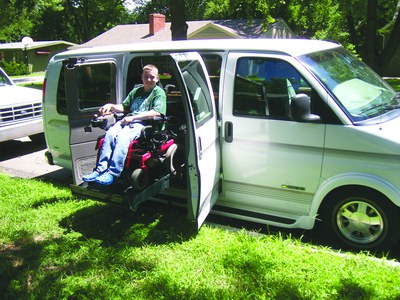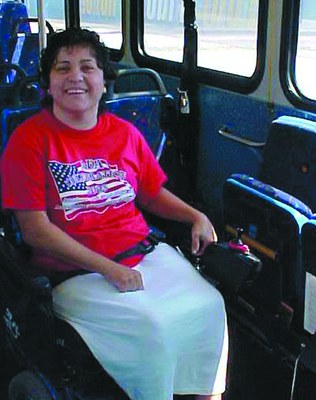Accessibility
Matthew's Story
Matthew Whaley was a 7-year-old Kansas boy with Cerebral Palsy who wanted what many kids his age wanted, to play little league baseball. While Matthew had some mobility challenges, he requested no rule changes or accommodations; he just wanted to take the field with other kids his age. Yet solely because of his disability, the Scott City Recreation Commission refused to allow Matthew to play ball. His mother, Jennifer, knew that it wasn’t right to exclude Matthew simply because of his disability. She contacted the Disability Rights Center of Kansas (DRC) seeking information about Matthew’s legal rights.
The DRC’s legal team met with Jennifer and Matthew and quickly recognized that excluding Matthew from a youth recreation activity was a violation of Matthew’s civil rights under the Americans with Disabilities Act (ADA). Under the ADA, all public programs or services, including city sponsored recreational sports, must be accessible to and inclusive of people with disabilities. In response to Scott City’s denial of Matthew’s request to play baseball, DRC Attorneys filed a federal lawsuit on Matthew’s behalf to enforce his rights under the ADA.

After hearing the evidence, U.S. District Court Judge J. Thomas Marten looked at Matthew in the courtroom and said, “Matthew, you’re going to play baseball this summer.” Judge Marten imposed a preliminary injunction ordering the commission to allow Matthew to join the team and play ball. Judge Marten told Matthew that “Little league baseball is not just about fielding skills, hitting skills and winning. It’s about character and teamwork and toughness”. Matthew got his wish to play baseball. The ruling was a positive precedent for all Kansans with disabilities. It helped re-enforce the rights of all people with disabilities under the ADA and helped ensure that individuals with disabilities would enjoy full integration into all public programs and services, even recreational opportunities. As news of the decision spread, Matthew’s notoriety as a pioneer for the rights of people with disabilities grew. He received an autographed baseball from George Brett, a former Kansas City Royal and member of the Major League Baseball Hall of Fame. Kansas Governor Kathleen Sebelius had contacted Brett and asked if he would sign the ball in recognition of Matthew’s courage to stand up and fight for his rights.
The next summer, Matthew was honored in Washington D.C. at a celebration of the 15th anniversary of the (ADA). Matthew and Jennifer provided testimony to a Congressional briefing which was cosponsored by the Congressional Disability Caucus and the Consortium of Citizens with Disabilities. After the hearing, Jennifer, Matthew’s mom, said, “It meant a lot to have that honor because it is more than just a small issue with Matthew. We hope that our case will give other parents the courage to see that it is OK to stand up for their rights and their children’s rights.” Matthew’s story was so compelling that it was picked up by the national media and was featured as a case example of what is good about the ADA on NPR’s Morning Edition.
State Forced to Change Policy to Cover Power Chairs

Independence and self-care are rights under the Federal Medicaid Act. Laura Kust and Tabitha Wade request for power chairs fell under those right but they were denied based upon the State of Kansas’ restrictive criteria. Kansas’ criteria required adults to either work or attend school to obtain a power chair or accessories. Power accessories include devices which provide individuals with disabilities the ability to independently operate their power chairs. Kansas required adults to either work or attend school in order to obtain a power chair or power accessory. DRC argued that the policy was both short-sighted and violated federal law because it was not based on medical necessity and made it impossible for many Kansans to obtain power chairs. First, some Kansans have such significant disabilities that they don’t work or attend school, but still need power chairs. Secondly, the policy also created a catch-22, because how is a Kansan who needs a power chair supposed to get or keep a job without one? The policy made it a prerequisite to either have a job or be in school. Quite simply a power chair may be the only effective way that person can get around independently. To tie access to such a life changing device to some unnecessary standard is unacceptable and forced greater dependence on the system. This unfair criteria had never been challenged previously. DRC knew that the state’s policy was wrong and represented Laura and Tabitha to challenge it legally. This is an example of an “impact case,” which is one where DRC represents a small number of people in order to try to obtain a change that will impact a much larger group of Kansans. According to National Center for Health Statistics (NCHS) it is estimated that upwards of 19,000 Kansans use power chairs or other mobility devices. Laura has a diagnosis of Cerebral Palsy and uses a power chair for mobility. Tabitha has a diagnosis of Spina Bifida and uses a power chair for mobility. Both obtained separate evaluations from their local seating clinics which determined that their power chairs or accessories did not meet their physical needs and that new equipment was medically necessary. Requests for the proper power chairs and accessories were submitted to Kansas Medicaid, but were denied because Laura and Tabitha were not working or attending school. Two DRC attorneys filed requests for a fair hearing challenging the denials. DRC asserted denials based upon criteria of working or attending school violated the Medicaid Act. The DRC attorneys successfully persuaded the State of Kansas that the power mobility devices were medically necessary for Laura and Tabitha and that they must be provided pursuant to federal Medicaid law. Kansas Medicaid overturned its original denial and agreed to purchase the requested devices. Even more important, challenging this case caused the State of Kansas to change the underlying flawed policy regarding power chairs and accessories! Effective January 1, 2013, Kansas eliminated the unnecessary requirement that an adult must be working or attending school to be approved for a power chair or accessory. Eliminating this misguided policy ensures that all Kansans with mobility impairments can have access to needed power chairs and accessories.
Advocates make Wichita Buses Accessible
People with disabilities face discrimination every day. Some times even governmental entities can discriminate against people with disabilities, such as when a program or service is not accessible to or usable by people with disabilities. For years in Wichita, the bus system was not accessible to people with disabilities. The buses typically did not have ramps, Braille wasn’t available, and in general the system was not accessible. The actions of the bus system discriminated against people with disabilities because it did not allow people with disabilities to be free to move about their community the same way anyone else would.
In late August 2004, the United States Court of Appeals for the Tenth Circuit supported the right of people with disabilities to enforce the Americans with Disabilities Act (ADA) and the Rehabilitation Act. The Court upheld this right after hearing an appeal regarding several plaintiffs with disabilities who were “testers” (advocates who test access and other potential violations of the law) of access to the City of Wichita’s public transit system.
The original case, Tandy v. City of Wichita, started when Mike Oxford, Executive Director of the Topeka Independent Living Resource Center (TILRC), received several complaints about the Wichita Transit fixed route bus service. As the leader of Kansas ADAPT, Oxford organized and mobilized 63 advocates from across the state to test the Wichita transit system.
In the spring of 2001 the advocates tested the Wichita Transit for access, services, Braille, and communication. The transit system failed terribly, leaving advocates stranded all over the community. Braille was not available, people were not secured, stops were not called, lifts were not on buses, and when lifts were on buses, drivers refused to deploy them.
Ten of the advocates filed a lawsuit in federal court against Wichita Transit on these accessibility issues, originally assisted by an attorney of TILRC. In District Court, Judge Thomas Marten issued a permanent injunction against Wichita for its long-standing policy and practice of refusing to deploy lifts on routes they designated as “not accessible.” This forced Wichita to transform its bus system and make the routes and buses accessible.
Judge Marten, however, also ruled that only three of the advocates were entitled to a trial, but dismissed the other seven for lack of “standing.” The judge ruled that they didn’t have standing to be able to file a complaint because they were not residents of Wichita. Those seven advocates appealed to the United States Court of Appeals for the Tenth Circuit. The case then came to the Disability Rights Center of Kansas (DRC). DRC litigated the case from that point forward. The issue at the heart of the appeal was the legal standing of the “testers.” Several of the plaintiffs were not from Wichita, but went to the city as “testers” to examine the accessibility of the fixed-route bus system. The City of Wichita argued that they did not have standing. The lower court agreed with the City and dismissed 7 of the 10 plaintiffs in the case, which made them ineligible for damages or a court order to stop the discriminatory policies. This was a very bad ruling for people with disabilities. Often times “testers” are the people who have the most knowledge of about accessible services and disability rights.
DRC attorneys appealed the lower Court’s decision to the Tenth Circuit Court of Appeals, which is just one step below the US Supreme Court. A three-judge panel at the Ten Circuit Court of Appeals ruled that even one-time users who will return and use the transit system have the right to both a court order for access and to damages for violation of the ADA and Rehabilitation Act. This decision has a large systemic impact for people with disabilities, because it requires all courts in the 10th Circuit, (Kansas, Oklahoma, Colorado, Wyoming, New Mexico, and Utah), to apply the new standard set forth in this decision regarding the rights of testers to hold systems accountable.

This is a significant win for people with disabilities who will now have more power as testers to hold cities accountable for violations of the ADA for accessibility. People with disabilities have a civil right to access public transportation services. This decision gives individuals with disabilities throughout Kansas the power to enforce that right.
Right to Service Animal Protected

The Americans with Disabilities Act (ADA) clearly states that service animals are not pets and specific rights are granted for their use. However, it is not uncommon for people with disabilities to be denied access to utilize their service animals as a result of this common misperception. David’s experience highlights this exact situation. David has Cerebral Palsy and uses a wheelchair. He also relies on a service dog for many tasks to make his life more manageable and to live independently. When David and his service dog tried to access transportation services to get to his medical appointments, the transportation provider denied David and his service dog access to the vehicle. David contacted DRC for legal advice and assistance. With the help of a DRC attorney, David filed a complaint with the Kansas Human Rights Commission (KHRC). After an investigation, KHRC determined that the transportation provider violated David’s rights under the ADA. DRC filed a legal case on David’s behalf after mediation failed and due to this legal action the case was successfully resolved. The resolution included the company providing training on disability sensitivity and service animals to its employees and a monetary settlement for the client.
DRC Helps Client Self-Advocate for Seizure Dog

The use of seizure dogs began in this country in the mid-1980’s. At the time, a woman with epilepsy was taking part in a Washington state project involving dogs and she discovered that one of the dogs seemed to sense when she was going to have a seizure. Today, seizure dogs have been trained to bark and alert others when a person is having a seizure; lie next to someone who is having a seizure to prevent injury; provide physical support to help a person stand after falling from a seizure; and activate an alarm system when a person has had a seizure.
Jane Hoene is a Kansan who has had epileptic seizures since childhood. As an adult, she decided to obtain a seizure dog to be her service animal. In 2006, Jane applied for a dog through CARES, Inc. in Concordia, Kansas. The waiting list for a dog can be years. However, in April 2009, CARES, Inc. contacted Jane and told her a dog was available. Unfortunately, CARES Inc. increased the cost of the dog from $500 to $2500. The original application and contract stated that Jane would pay $500. Jane did not have $2500 for the dog.
With the assistance of SKIL of Western Kansas, Jane contacted the Disability Rights Center for help. After reviewing all the documents, DRC assisted Jane and prepared for her an individualized self-advocacy plan. By following this plan, Jane and SKIL were able to work with CARES, Inc. to dramatically lower the cost. Also, Vocational Rehabilitation Services agreed to pay the cost for the dog and the expenses for the week-long training with the dog.
Jane’s seizer dog is a 2 ½ year old red Australian Sheppard named Rory. During the week-long training, Jane learned about commands and how to be the “alpha dog”. This is a critical part of having a service dog. Rory and Jane completed the training and are getting along great. Rory has already been a help to Jane when she has seizures. Rory is also being trained to allow Jane to use him as a “brace” to help her stand if she has fallen. Next, Jane hopes to teach Rory to press a lifeline button if Jane is unable to assist herself.
Providing individuals with self-advocacy support is a big part of what DRC does. It ensures that the person has the legal advice and self-advocacy tools needed to get the issue resolved.
DRC Helps Change Hospital ASL Policy
DRC worked on a legally based advocacy case that not only helped the individual client, it also helped change the policy regarding access to American Sign Language (ASL) and communication accommodations for the largest American hospital corporation. This is an example of an impact case where DRC’s service helped a larger group of Kansans. According to Gallaudet University, there are over 108,000 Kansans who are Deaf.
Effective communication is critical in any situation. When people who are Deaf or hearing impaired are denied access to effective communication, the situation can become untenable. DRC clients John and Suzy (names changed to protect identity) found themselves in that exact situation. John and Suzy are Deaf. Their primary language is ASL. They have very limited written English skills. Unfortunately, John and Suzy were in a car accident and had to be taken to Overland Park Regional Medical Center by ambulance. The hospital is owned by the Hospital Corporation of America/Midwest Division (HCA). HCA is the largest hospital corporation in the United States. John and Suzy requested an ASL interpreter, as is their right under the Americans with Disabilities Act (ADA) and Section 504 of the Rehabilitation Act of 1973 (Rehab Act). The ADA and Rehab Act require the hospital to have a procedure for providing effective communication with patients with hearing impairments when providing emergency treatment. The purpose of these laws is to provide people with disabilities equal access to care and the opportunity to provide informed consent for medical treatment. Communicating only by handwritten notes or other written communication – especially complex issues such as diagnosis and treatment – is not effective if a Deaf patient has only a limited ability to understand that form of communication.

The hospital, however, failed to provide an ASL interpreter or any other effective means of communication. Instead, from the time they were admitted to the ER, examined, diagnosed, treated, and then discharged, John and Suzy had to exchange written communication with hospital staff. They could not understand what was being said to them and understandably were quite scared. John and Suzy contacted DRC for assistance. DRC helped them file a Kansas Human Rights Commission (KHRC) complaint.
The complaint alleged that the hospital failed to provide equal access to care and obtain informed consent for medical care because treatment was provided to John and Suzy without a reasonable accommodation of ASL or video translating in violation of the ADA and the Rehabilitation Act. KHRC notified DRC that HCA wanted to settle the matter. HCA offered, and John and Suzy accepted, the maximum amount under the law for the injustice they endured.
Equally important, as a result of the complaint HCA changed its policies and procedures to provide effective communication to patients who are Deaf and hearing impaired. HCA is one of the largest private operators of healthcare facilities in the world. It operates 273 hospitals in 20 states, including eight in Kansas and ten in the Kansas City metro area. HCA assured KHRC that this case resulted in significant policy changes in all of their healthcare facilities. This outcome ensures that this case has a positive impact in the lives of people with disabilities in 20 states, including the over 100,000 Kansans who are Deaf.
.png)





